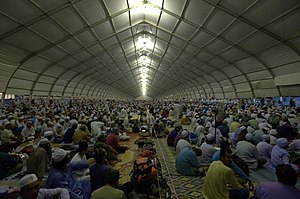
Back جماعة التبليغ Arabic جماعة التبليغ ARZ তাবলিগ জামাত Bengali/Bangla کۆمەڵەی ئاگادارکەرەوەکان CKB Tablighi Jamaat German Tabligh Spanish جماعت تبلیغ Persian Tabligh Finnish Tablighi Jamaat French तबलीग़ी जमात Hindi
 | |
| Total population | |
|---|---|
| 80 to 150 million[1] | |
| Founder | |
| Muhammad Ilyas Kandhlawi[2] | |
| Religions | |
| Deobandi Islam[2][3][4] | |
| Scriptures | |
| Quran, and Hadith, Fada'il series, Hayat al-Sahaba |
| Part of a series on |
| Islam |
|---|
 |
| Part of a series on the |
| Deobandi movement |
|---|
 |
| Ideology and influences |
| Founders and key figures |
|
| Notable institutions |
| Centres (markaz) of Tablighi Jamaat |
| Associated organizations |
Tablighi Jamaat (Urdu: تبلیغی جماعتlit. 'Society of Preachers',[5][6] also translated as "propagation party" or "preaching party")[2][3][4] is an international Islamic religious movement.[2][3] It focuses on exhorting Muslims to be more religiously observant[1] and encourages fellow members to return to practise their religion according to the teachings of the Islamic prophet Muhammad,[7] and secondarily give dawah (calling) to non-Muslims.[4] "One of the most widespread Sunni" islah (reform)[4] and called "one of the most influential religious movements in 20th-century Islam,"[8] the organization is estimated to have between 12 and 80 million adherents worldwide,[1] spread over 150 countries,[3][4][9][10] with the majority living in South Asia.[11][12]
The group encourages its followers to undertake short-term preaching missions (khuruj), lasting from a few days to a few months in groups of usually forty days and four months, to preach to Muslims reminding them of "the core teachings of the Prophet Muhammad" and encourage them to attend mosque prayers and sermons. Members "travel, eat, sleep, wash and pray together in the mosques and often observe strict regimens relating to dress and personal grooming".[1]
Established in 1926 by Muhammad Ilyas Kandhlawi, in the Mewat region of British India, it has roots in the revivalist tradition of the Deobandi school,[4] and developed as a response to the deterioration of moral values and the neglect of aspects of Islam.[2] The movement aims for the spiritual reformation of Islam by working at the grassroots level.[9][13] The teachings of Tabligh Jamaat are expressed in "Six Principles": Kalimah (Declaration of faith), Salah (Prayer), Ilm-o-zikr (Reading and Remembrance), Ikraam-e-Muslim (Respect for Muslims), Ikhlas-e-Niyyat (Sincerity of intention), and Dawat-o-Tableegh (Proselytization).[14]
Tablighi Jamaat denies any political affiliation, involvement in debate over political or Islamic doctrine such as fiqh,[15][16][17] let alone terrorism.[15] It maintains its focus is on the study of the sacred scriptures of Islam: the Quran and the Hadith,[16][18] and that the personal spiritual renewal that results will lead to reformation of society.[1] However, the group has been accused of maintaining political links,[9] and being used by members of Islamic terrorist organizations to recruit operatives.[3][4][11][15]
- ^ a b c d e "Tablighi Jama'at". Pew Research Center. 15 September 2010. Archived from the original on 2 April 2020. Retrieved 6 April 2020.
- ^ a b c d e Pieri, Zacharias (2021). "Part 1: Sunnī Traditions – Tablīghī Jamāʿat". In Cusack, Carole M.; Upal, M. Afzal (eds.). Handbook of Islamic Sects and Movements. Brill Handbooks on Contemporary Religion. Vol. 21. Leiden and Boston: Brill Publishers. pp. 49–72. doi:10.1163/9789004435544_005. ISBN 978-90-04-43554-4. ISSN 1874-6691.
- ^ a b c d e Burki, Shireen Khan (2013). "The Tablighi Jama'at: Proselytizing Missionaries or Trojan Horse?". Journal of Applied Security Research. 8 (1). London: Routledge: 98–117. doi:10.1080/19361610.2013.738407. ISSN 1936-1629. S2CID 144466130.
- ^ a b c d e f g Kuiper, Matthew J. (22 February 2018). "Tablighi Jamaʿat - Oxford Islamic Studies Online". www.oxfordbibliographies.com. Oxford University Press. Archived from the original on 3 March 2018. Retrieved 6 January 2021.
- ^ Johny, Stanly (2 April 2020), "Explained, Who are the Tablighi Jamaat?", The Hindu, Chennai
- ^ Desai, Ebrahim (9 June 2007), "Fatwa # 15332 from Sri Lanka", Ask Imam, Online Islamic Q & A with Mufti Ebrahim Desai Darul Iftaa, archived from the original on 6 February 2012
"Tableegh literally means 'to convey'. Contextually, it refers to conveying the message of Islam." - ^ Taylor, Jenny (8 September 2009). "What is the Tablighi Jamaat?". The Guardian. Archived from the original on 22 January 2016. Retrieved 12 January 2016.
- ^ Ahmad (1994), p. 524
- ^ a b c Burton, Fred; Scott Stewart (23 January 2008). "Tablighi Jamaat: An Indirect Line to Terrorism". Stratfor Intelligence. Archived from the original on 5 September 2014. Retrieved 10 August 2009.
- ^ Cite error: The named reference
masoodi-16-9-13was invoked but never defined (see the help page). - ^ a b Howenstein, Nicholas (12 October 2006). "Islamist Networks: The Case of Tablighi Jamaat". www.usip.org. Washington, D.C.: United States Institute of Peace. Archived from the original on 18 June 2017. Retrieved 4 December 2021.
- ^ Sameer Arshad (22 July 2007). "Tabligh, or the enigma of revival". The Times of India. Archived from the original on 8 January 2016. Retrieved 2 May 2009.
- ^ Dominic Kennedy and Hannah Devlin (19 August 2006). "Disbelief and shame in a community of divided faith". The Times. London. Archived from the original on 7 April 2014. Retrieved 8 May 2009.
- ^ Howenstein, Nicholas (12 October 2006). "Islamic Networks: The case of the Tablighi Jamaat". United States Institute of Peace. Archived from the original on 29 October 2016.
- ^ a b c Cite error: The named reference
pacifistswas invoked but never defined (see the help page). - ^ a b Ayoob 2007, p. 135
- ^ Syed, Jawad; Pio, Edwina; Kamran, Tahir; Zaidi, Abbas, eds. (2016). Faith-Based Violence and Deobandi Militancy in Pakistan. Basingstoke: Palgrave Macmillan. p. 67. doi:10.1057/978-1-349-94966-3. ISBN 978-1-349-94965-6. LCCN 2016951736.
- ^ Jenkins, Philip (2007). God's continent (illustrated, annotated ed.). New York: Oxford University Press. p. 340. ISBN 978-0-19-531395-6.
tablighi.